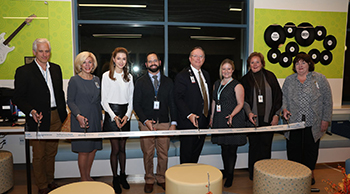
Popular Locations
- Yale New Haven Children's Hospital
- Yale New Haven Hospital - York Street Campus
- Yale New Haven Hospital - Saint Raphael Campus


The Yale New Haven Children’s Hospital Lauren Telesz/Smilow Teen Center is a space where patients with the Adolescent and Young Adult Oncology program can socialize, watch movies, play video games or just hang out. Officially opening the center last year were (l-r): Gary Kupfer, MD, pediatric hematologist/oncologist; Cynthia Sparer, senior vice president, Operations, and executive director, YNHCH; Telesz, a cancer survivor and Yale University student; Asher Marks, MD, AYA Oncology program medical director; Clifford Bogue, MD, chief medical officer, YNHCH; Amanda Garbatini, adolescent and young adult coordinator, YNHCH; Connie Nicolosi, LCSW, Social Work manager, YNHCH; and Ellen Good, manager, Child Life program, YNHCH.
The years between ages 13 and 30 can be both exciting and challenging. They’re a time of physical, emotional and life changes, when adolescents and young adults find themselves immersed in school, entering the workforce, dating or starting a family.
Imagine dealing with that, and cancer.
“The first thing I do when I meet with new patients is acknowledge that being a teen or young adult is hard, and having a cancer diagnosis makes it even harder,” said Amanda Garbatini, adolescent and young adult coordinator, Yale New Haven Children’s Hospital.
Garbatini is part of YNHCH’s Adolescent and Young Adult Oncology program, which provides treatment, support and research for a patient population that has historically been underserved nationwide.
According to the American Cancer Society, about 70,000 people ages 15 to 39 are diagnosed with cancer annually in the United States. Cancer is the leading disease-related cause of death for this age group. Young adults are more likely than younger children or older adults to be diagnosed with certain cancers, such as Hodgkin’s lymphoma, testicular cancer and sarcomas. When it is detected, cancer in adolescents and young adults (AYAs) tends to be more advanced than in other age groups.
In the past, AYAs were cared for by adult or pediatric physicians, depending on cancer type and patient and family preference.
“Medically, we had the training and skills to treat the disease, but we needed additional resources to meet these patients’ unique needs,” said Asher Marks, MD, director, Pediatric Neuro-Oncology and AYA Oncology program medical director.
The program launched nearly six years ago, combining resources from the children’s hospital and Smilow Cancer Hospital to care for patients ages 13 to 30. In addition to oncologists, the program includes advanced practice providers, nurses, social workers, psychologists and psychiatrists, child-life specialists and other team members with expertise in working with adolescents and young adults.
Garbatini coordinates the programs that enhance patients’ medical and psychosocial care and provide connections with other AYA patients. “Friends can be supportive, but they don’t necessarily know what it’s like to have cancer,” said Garbatini, who had cancer as an adolescent and young adult. “Cancer changes your life in so many ways, it’s an important part of who you become. Having that connection with other patients your age is critical.”
She also helps patients with other aspects of their lives, such as applying to colleges and navigating relationships. She recalled talking to a patient who had been dating someone for a year, but didn’t know how to tell the other person about the cancer.
“This kind of support does more than improve patients’ quality of life,” Dr. Marks said. “Research shows that patients who have psychosocial support do better in general.”
The AYA Oncology program is also expanding research for patients under age 18, who haven’t traditionally been offered the opportunity to participate in clinical trials.
“What we’re finding as we delve into certain cancers is that they might initially look the same as they do in younger children and older adults, but they can be unique in the AYA population,” Dr. Marks said. “More research is needed to find out why, and how we can target treatments for adolescents and young adults.”
One of the most challenging aspects of treating AYAs is finding a balance between respecting their independence and providing support when they need it.
“Adolescents and young adults don’t want to be treated like children, but they don’t always want you to be so formal,” Garbatini said.
Dr. Asher has a card from a former patient that illustrates this point. The patient expressed appreciation for the medical care he provided and added, at the end, “Thank you for not being so serious all the time.’”